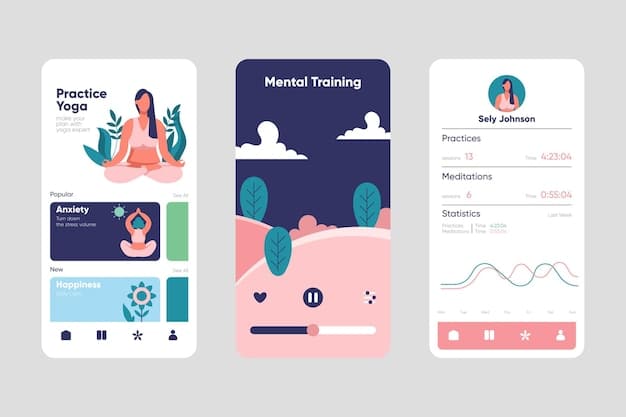AI Mental Wellness: How Gen Z Manages Stress and Anxiety

Gen Z is increasingly turning to AI-driven mental wellness apps to proactively manage stress and anxiety, offering personalized and accessible support.
How Gen Z is Using AI-Driven Mental Wellness Apps to Combat Stress and Anxiety highlights the tech-savvy generation’s embrace of innovative tools for mental well-being.
Gen Z’s Mental Health Landscape
Gen Z, born between the late 1990s and the early 2010s, is known for its digital fluency. However, they also face unique mental health challenges. Understanding these challenges is crucial to appreciating their adoption of AI-driven solutions.
Unique Stressors Faced by Gen Z
Gen Z has grown up in a rapidly changing world, constantly bombarded with information and societal pressures. The prevalence of social media, academic demands, and economic uncertainties has contributed to heightened stress and anxiety levels.
- Social Media Pressure: Constant exposure to curated content leading to feelings of inadequacy.
- Academic and Career Expectations: Intense competition and pressure to succeed.
- Economic Uncertainty: Worries about job prospects and financial stability.
- Global Issues: Awareness and anxiety related to climate change, political instability, and social justice.
These factors combine to create a perfect storm of stress, leading many in Gen Z to seek innovative ways to cope and maintain their mental well-being.
In conclusion, Gen Z faces distinct mental health challenges driven by digital exposure, societal pressures, and global issues, fueling their search for AI-driven mental wellness solutions.
The Rise of AI in Mental Wellness
Artificial intelligence is revolutionizing numerous sectors, and mental health is no exception. AI’s ability to analyze data and personalize experiences is making mental wellness tools more accessible and effective for Gen Z.
What are AI-Driven Mental Wellness Apps?
These apps utilize AI algorithms to provide personalized support, track moods, offer coping strategies, and even simulate therapy sessions. They aim to bridge the gap between traditional mental health care and the immediate needs of users.

Key Features of AI Mental Wellness Apps
AI mental wellness apps offer a range of features designed to cater to the diverse needs of users. These include:
- Mood Tracking: Allows users to monitor their emotional state over time, identifying patterns and triggers.
- Personalized Meditation and Mindfulness Exercises: Tailored to individual needs and preferences, promoting relaxation and stress reduction.
- AI Chatbots: Provide instant support and guidance, simulating conversations with a therapist or counselor.
- Cognitive Behavioral Therapy (CBT) Techniques: Offers structured exercises and activities to help users manage negative thoughts and behaviors.
These features provide Gen Z with accessible and personalized tools to proactively manage their mental health.
In summary, AI-driven mental wellness apps offer personalized support, mood tracking, and therapy simulations, empowering Gen Z with accessible mental health tools.
Why Gen Z is Turning to AI for Mental Health
Gen Z’s affinity for technology makes AI-based mental wellness solutions a natural fit. Several factors explain their growing reliance on these apps.
Accessibility and Convenience
Traditional mental health care can be expensive and difficult to access, particularly for those in remote areas or without adequate insurance. AI apps offer a more affordable and convenient alternative.
Anonymity and Reduced Stigma
Many feel uncomfortable discussing their mental health concerns face-to-face. AI apps provide a level of anonymity, allowing users to seek support without fear of judgment or stigma.
Personalized and On-Demand Support
AI algorithms can analyze user data to provide tailored recommendations and support, available anytime and anywhere. This personalized and on-demand approach resonates with Gen Z’s desire for instant gratification and customized experiences.
Gen Z’s preference for AI mental health solutions is driven by accessibility, anonymity, and personalized support.
Examples of Popular AI Mental Wellness Apps
Numerous AI-driven mental wellness apps have gained popularity among Gen Z. Each offers unique features and approaches to supporting mental health.
Woebot
Woebot is an AI chatbot designed to provide instant support and guidance, simulating conversations with a therapist or counselor. It uses CBT techniques to help users manage negative thoughts and behaviors.
Calm
Calm offers a range of meditation and mindfulness exercises, personalized to individual needs and preferences. It promotes relaxation and stress reduction through guided meditations and calming audio content.

Headspace
Headspace provides a comprehensive suite of mindfulness tools, including guided meditations, sleep stories, and stress-reduction exercises. It focuses on teaching users practical skills to manage their mental well-being.
These apps represent a growing trend of AI-powered mental wellness tools catering to Gen Z’s specific needs.
In essence, Woebot, Calm, and Headspace are popular AI mental wellness apps offering CBT techniques, personalized meditation, and comprehensive mindfulness tools for Gen Z.
The Benefits and Limitations of AI Mental Wellness Apps
While AI mental wellness apps offer numerous benefits, it is important to recognize their limitations and potential drawbacks.
Potential Benefits
- Increased Access to Mental Health Support: Makes mental health care more accessible to underserved populations.
- Personalized and Convenient: Offers tailored support and guidance, available anytime and anywhere.
- Early Detection of Mental Health Issues: AI algorithms can identify patterns and triggers, facilitating early intervention.
Potential Limitations
- Lack of Human Connection: AI chatbots cannot replace the empathy and understanding of a human therapist.
- Data Privacy Concerns: Users must trust that their personal data is being handled securely and ethically.
- Effectiveness Concerns: The long-term effectiveness of AI mental wellness apps is still being studied.
- Dependence and Over-Reliance: Over-reliance on apps may prevent individuals from seeking more comprehensive mental health care when needed.
AI mental wellness apps offer benefits like increased access and personalization but have limitations including lack of human connection and data privacy.
The Future of AI and Mental Health for Gen Z
The integration of AI into mental health care is poised to expand further, offering new opportunities and possibilities for Gen Z and beyond.
Advancements in AI Technology
As AI technology continues to evolve, we can expect to see even more sophisticated and personalized mental wellness tools. Future apps may incorporate:
- Emotion Recognition: AI that can detect and respond to users’ emotional states in real-time.
- Virtual Reality (VR) Therapy: Immersive VR experiences that simulate real-world scenarios, helping users manage anxiety and phobias.
- Predictive Analytics: AI that can predict mental health crises and provide proactive interventions.
These advancements have the potential to revolutionize the way mental health care is delivered and accessed.
The future of AI in mental health includes emotion recognition, VR therapy, and predictive analytics, enhancing personalized care for Gen Z.
| Key Point | Brief Description |
|---|---|
| 📱 Accessibility | AI apps provide mental health support anytime, anywhere. |
| 🤖 Personalized Support | AI algorithms tailor mental wellness advice to individual needs. |
| 📊 Mood Tracking | Apps monitor emotional states and identify stress triggers. |
| 🔒 Anonymity | Users can seek support without fear of judgment. |
Frequently Asked Questions
▼
While promising, research on the long-term effectiveness of AI mental wellness apps is still ongoing. Many users report positive experiences, but it’s essential to consider individual needs and preferences.
▼
No, AI mental wellness apps are not a replacement for traditional therapy. They can be a useful tool for self-management and early intervention, but professional help is essential for serious conditions.
▼
It varies. Users should carefully review the privacy policies of any app before using it. Look for apps that use encryption and are transparent about data handling practices to ensure your information is protected.
▼
AI chatbots use natural language processing (NLP) to understand user input and provide responses based on pre-programmed algorithms. They often use techniques from cognitive behavioral therapy (CBT) to guide conversations.
▼
Consider your specific needs, app features, user reviews, privacy policies, and cost. Look for apps with evidence-based techniques, positive user feedback, strong data protection measures, and transparent pricing.
Conclusion
How Gen Z is Using AI-Driven Mental Wellness Apps to Combat Stress and Anxiety reveals a significant trend: the proactive adoption of technology for mental well-being. While these apps offer numerous benefits, it’s essential to approach them with informed awareness and integrate them thoughtfully within a broader mental health strategy.





